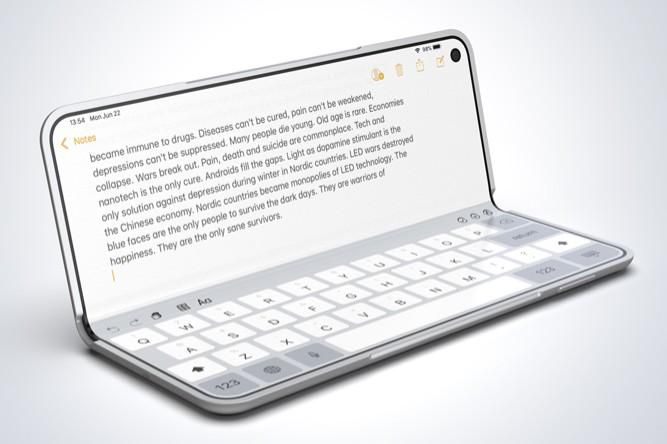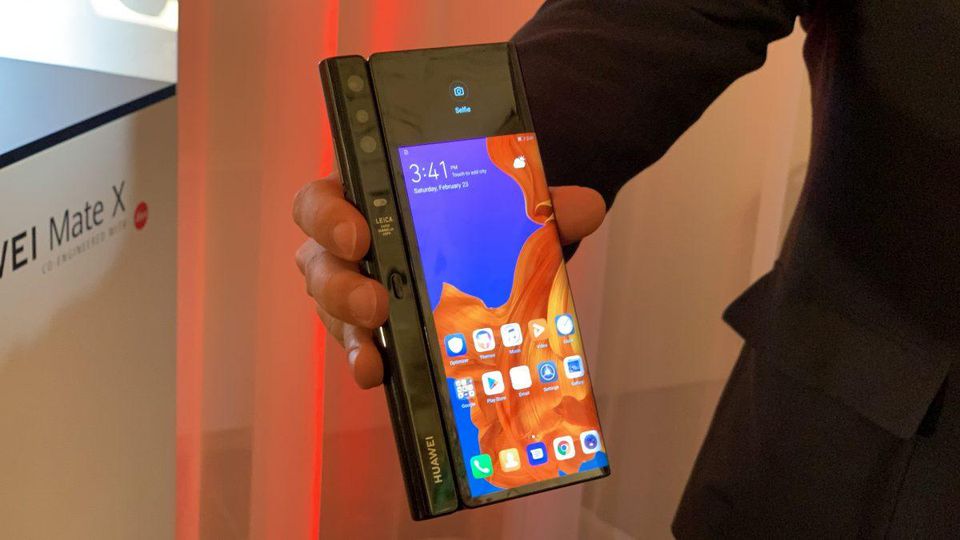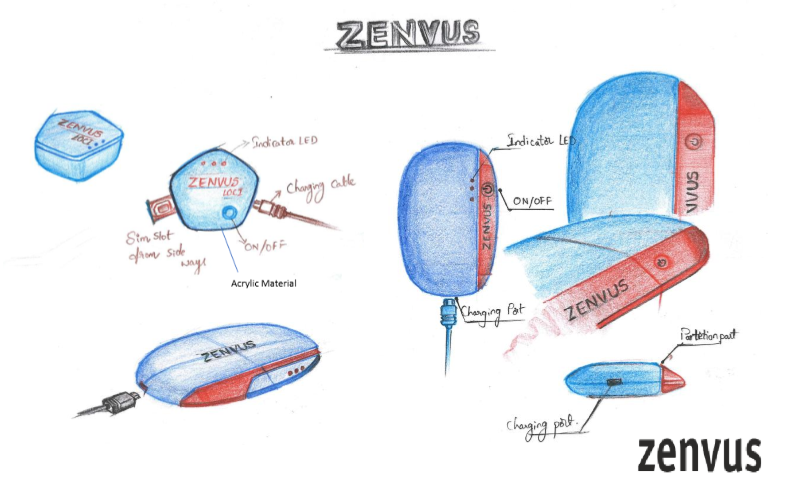This is the final for 2019 Presidential election result
Nigerians voted on 23 February. President Muhammadu Buhari (APC) faced former Vice President Atiku Abubakar (PDP). APC won 19 states while PDP won 18. Also, APC won 15,191,847 votes while PDP picked 11,262,978 votes.
To be declared the winner, an aspirant must win a majority of votes cast, and at least 25% of the votes in 24 or more of the 36 states. Based on these numbers, President Buhari is projected to be re-elected.
Results for all states
| APC | PDP | AAC | YPP | ANN | |
|---|---|---|---|---|---|
| Abia | 85,058 | 219,698 | 212 | 720 | 88 |
| Adamawa | 378,078 | 410,266 | 282 | 109 | 162 |
| Akwa Ibom | 175,429 | 395,832 | 222 | 118 | 95 |
| Anambra | 33,298 | 524,738 | 124 | 4,091 | 45 |
| Bauchi | 798,428 | 209,313 | 183 | 112 | 46 |
| Bayelsa | 118,821 | 197,933 | 126 | 50 | 37 |
| Benue | 347,668 | 356,817 | 309 | 557 | 201 |
| Borno | 836,496 | 71,788 | 269 | 78 | 29 |
| Cross River | 117,302 | 295,737 | 242 | 217 | 88 |
| Delta | 221,292 | 594,068 | 1,626 | 497 | 320 |
| Ebonyi | 90,726 | 258,573 | 205 | 192 | 683 |
| Edo | 267,842 | 275,691 | 3,106 | 531 | 273 |
| Ekiti | 219,231 | 154,032 | 400 | 68 | 88 |
| Enugu | 54,423 | 355,553 | 219 | 1,379 | 141 |
| FCT | 152,224 | 259,997 | 583 | 1,083 | 652 |
| Gombe | 402,961 | 138,484 | 165 | 39 | 78 |
| Imo | 140,463 | 334,923 | 467 | 676 | 119 |
| Jigawa | 794,738 | 289,895 | 226 | 67 | 66 |
| Kaduna | 993,445 | 649,612 | 243 | 196 | 261 |
| Kano | 1,464,768 | 391,593 | 416 | 200 | 114 |
| Katsina | 1,232,133 | 308,056 | 186 | 61 | 82 |
| Kebbi | 581,552 | 154,282 | 276 | 53 | 99 |
| Kogi | 285,894 | 218,207 | 250 | 87 | 89 |
| Kwara | 308,984 | 138,184 | 401 | 140 | 422 |
| Lagos | 580,825 | 448,015 | 8,910 | 5,733 | 6,946 |
| Nasarawa | 289,903 | 283,847 | 75 | 44 | 45 |
| Niger | 612,371 | 218,052 | 324 | 113 | 145 |
| Ogun | 281,762 | 194,655 | 3,196 | 553 | 1,509 |
| Ondo | 241,769 | 275,901 | 4,414 | 1,224 | 311 |
| Osun | 347,634 | 337,377 | 1,022 | 189 | 268 |
| Oyo | 365,229 | 366,690 | 4,014 | 1,608 | 1,896 |
| Plateau | 468,555 | 548,665 | 268 | 442 | 796 |
| Rivers | 150,710 | 473,971 | 372 | 415 | 365 |
| Sokoto | 490,333 | 361,604 | 181 | 84 | 124 |
| Taraba | 324,906 | 374,743 | 116 | 80 | 35 |
| Yobe | 497,914 | 50,763 | 137 | 36 | 37 |
| Zamfara | 438,682 | 125,423 | 186 | 44 | 24 |
| Total: | 15,191,847 | 11,262,978 | 33,953 | 21,886 | 16,779 |
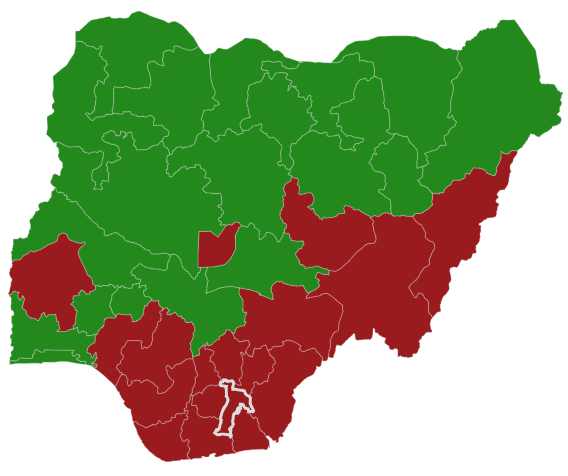
- PDP (Atiku) has won 17 states, APC (Buhari) 16. Remaining to call are Zamfara, Kebbi, Rivers, and Sokoto. Of course, the numbers (total votes) look better for APC.
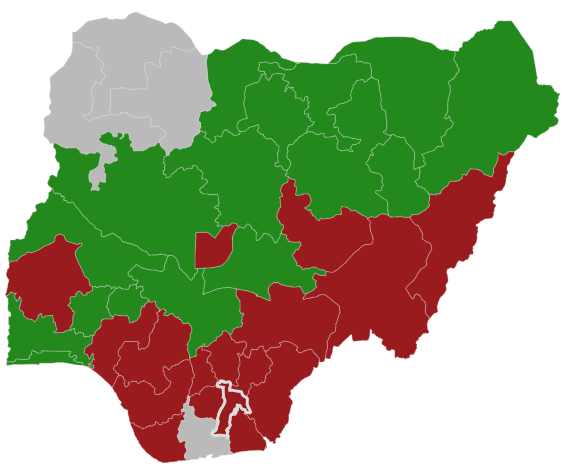
- Atiku wins Edo
- Buhari wins Bauchi
- Atiku wins Imo
- Atiku wins Anambra in a landslide
- Atiku wins Benue, narrowly
- Buhari wins Niger state
- Buhari wins Kano with more than 1 million votes over Atiku
- Atiku leads Buhari in 10 LGAs in Rivers
- Buhari wins Katsina
- Buhari wins 15 of 23 Kaduna LGAs
- Buhari wins Gombe
- Gov. Yari wins Zamfara West Senate Seat
- Atiku wins Enugu
- Buhari wins Lagos with over 130,000 votes
- Buhari wins Jigawa
- Atiku wins Akwa Ibom
- Buhari wins Ogun state
- Senate Deputy Leader, Bala Ibn NaÁllah, wins Kebbi South Senatorial seat
- Atiku wins Adamawa
- Atiku wins Plateau state
- Feb 25 at 6.30pm: Buhari has won 5 states (Ekiti, Kogi, Kwara, Nasarawa and Osun); PDP has won I state (FCT)
- on the map

- Atiku wins FCT
- Buhari wins Osun state
- The candidate of the All Progressives Congress (APC), Yakubu Oseni, has been declared winner of the Kogi Central Senatorial election. The incumbent Senator, Ahmed Ogembe of the Peoples Democratic Party, scored 19, 359 votes to come third in the election.
- The Independent National Electoral Commission (INEC), has declared Akon Eyakenyi of the Peoples Democratic Party (PDP) as the winner of Akwa Ibom South Senatorial seat.
- Binta Masi the senator representing Adamawa North has lost her reelection bid under the All Progressives Congress (APC) to Ishaku Cliff of the Peoples Democratic Party (PDP).
- Atiku takes wide lead in Anambra
- PDP wins Akwa Ibom South
- APC wins 2 Senate and 6 HOR so far announced in Kano
- Buhari wins Nasarawa State
- Buhari wins Yobe state
- Akpabio (Akwa Ibom) is projected to lose Senate. ThisDay has already called it for his challenger. The PDP senatorial candidate and former Deputy Governor of Akwa Ibom State, Christopher Ekpenyong, won in 8 of the 10 LGAs while Akpabio got one.
- Atiku (PDP) leading comfortably in Akwa Ibom ahead of Buhari (APC).
- PDP Bassey Albert (Akwa Ibom North East) re-elected for a second term. Defeats APC Bassey Etim – 147,731 votes to 60, 930.
- Buhari Wins in 15 of 16 LGAs in Kwara
- Atiku wins Ondo
- Atiku maintains lead in Adamawa
- Atiku takes early lead in Rivers
- INEC official declares Okorocha winner of senatorial election
- Buhari wins 9 of 23 LGAs in Sokoto, Atiku 3
- Atiku takes early lead in Benue
- It’s Official: Governor Ajimobi loses Senate election to PDP in Oyo
- After 16 local governments, Atiku leads Buhari in Adamawa
- Governor Rochas Okorocha is leading in election results announced so far from Imo West Senatorial District election.He has won in eight out of the 12 local governments in the district.
- Atiku Abubakar is set to be declared winner in Ondo State. He has won 11 of the 18 LGAs
- Speaker of the House, Dogara (PDP) wins in Bauchi. Mr Dogara was declared the winner by the returning officer for the constituency few minutes past 10 p.m. on Sunday.
- Orji Uzor Kalu (APC) has won Senate (Abia North). Kalu won with 30,580 votes while the closest opposition candidate from the Peoples Democratic Party, Senator Mao Ohuabunwa recorded 21,940 votes.
- Atiku (PDP) leading in 4 out of 5 LGAs declared in Imo state.
- Atiku (PDP) wins 9 out of 10 LGAs declared in Oyo. The state has 33 LGAs.
- Based on the announced results, Mr Saraki has effectively lost the Senate seat as he has lost 4 out of the 4 LGAs declared. This is now confirmed
- Buhari (APC) has defeated his main challenger, Atiku Abubakar of the PDP, in six LGAs in Katsina State. Results from more LGAs are expected.
- 4 out of 9 LGAs in Oyo South Senatorial District are out, APC Abiola Ajimobi (current governor) lost in all four. The PDP (Kola Balogun) won in all 4.
- Buhari (APC) has won 12 of the 13 local government areas so far declared in Kwara state; Atiku (PDP) won just one. Buhari won in incumbent governor and Senate president (Saraki)’s LGAs.
- Capital Oil Founder, Ifeanyi Ubah (YPP) has won Anambra South Senatorial District Results. PDP – 52,468. APC – 13,399. APGA – 51,054. YPP – 87,108
- The Senate Minority Leader, Biodun Olujimi (PDP, Ekiti South) has lost defeated by Dayo Adeyeye of APC – 53, 741 to 77, 621. Also, Fasina Abayomi (PDP, Ekiti) was defeated by an APC chieftain, Olubunmi Adetunbi – 49,209 to 60,689 . Opeyemi Bamidele of the APC and a former member of the House of Representatives was declared winner of the Ekiti Central Senatorial District, defeating the PDP counterpart, Obademi Adewale.While Mr Bamidele scored a total of 94,279, Mr Adewale polled a total of 48,707.votes. APC’s Olanrewaju Ibrahim was declared winner for Ekiti North 2 federal constituency. He scored 29,388 votes to beat Olusola Omotoso of the PDP who polled 23, 684 votes. Yemi Adaramodu of the APC is winner of the Ekiti South federal constituency having polled 41, 864 to beat Segun Adekola of the PDP who had 25, 707.
- Buhari in early lead in Kwara – win 8 of 9 LGAs called
- Buhari wins in first LGA in Adamawa to be called
- APC Ajibola Bashiru has emerged the winner of Osun Central Senatorial seat. Mr Bashiru was declared winner by the Returning Officer. The APC candidate had 132,821 votes against his closest rival, Ganiyu Olaoluwa, of the People’s Democratic Party (PDP) who polled 106,779 votes.
- The Imo State Governor, Rochas Okorocha, has won with wide margin the senatorial elections results in Ideato South Local Government Area (LGA) of the state. In the presidential polls, Muhammadu Buhari also scored 20,663 votes in the LGA to beat Atiku Abubakar, candidate of the PDP who polled 8,844 votes.
- PDP has won in 7 of the 10 local LGAs in Ondo State presidential election results released so far. Eight local governments are yet to be announced. The tally gives the PDP 118,358 votes, while the APC has 99,712 votes.
- President Muhammadu Buhari won PU003 polling unit at Sarkin Yara ward A, in Daura, Katsina. The president scored 523 votes while Atiku Abubakar of PDP got 3 votes. However, APC candidate for Katsina North, incumbent Kaita Baba-Ahmad, lost the unit to the candidate of Accord party, Lawal Nalado. Mr Nalado scored 263 while Mr Kaita scored 248 votes.
- President Muhammadu Buhari defeated Atiku Abubakar at Atiku’s polling unit. Mr Buhari scored 186 votes while Atiku got 167 votes.
Presidential
APC 141
PDP 25
Senate
APC 99
PDP 69
House of Reps
APC 107
PDP 55
Presidential
APC….212
PDP… 19
Senate
APC… 126
PDP… 78
House of reps
APC….122
PDP… 41
SDP…. 72
Presidential
APC….351
PDP…. 38
Senate
APC…. 236
PDP… 249
House of reps
APC 227
SDP….133
PDP.. 50
PRESIDENTIAL
APC 246
PDP 54
SENATORIAL
APC 105
PDP 176
HOUSE OF REPS
APC 198
PDP 98
Nasarawa LGA
Ward- Kaura Goje
RAC- 09
Polling Point- Kwanan Jaba Bus Stop VII 041
Presidential
APC 123
PDP 20
Senatorial
APC 97
PDP 42
Reps
APC 89
PDP 44
Total reg. voters- 460
Senatorial District: Kano central
LGA* Nasarawa
Ward* Kaura Goje
RAC* 09
Polling Unit* Kwanan Jaba 043
Presidential
APC 16
PDP 5
Invalid 2
Senatorial
APC 9
PDP 13
Invalid 1
Reps
APC 2
PDP 13
Invalid 2
Senatorial District: Kano central
LGA: Kano Municipal
Ward: Dan’Agundi
Polling Unit: (005)
Presidential
APC 123
PDP 28
PRP. 0
Invalid 9
Senatorial
APC 110
PDP 36
PRP. 2
PPN. 1
APA. 1
Invalid 10
House of Reps
APC 108
PDP 34
RPNP.. 2
PRP 4
YPP. 2
Invalid. 10
Total Reg voters… 365
Invalid…. 2
Presidential results
APC: 248
PDP: 3
Senatorial results
APC: 152
PDP: 98
House Of Reps results
APC: 179
PDP: 57
Presidential
PDP 25
APC 195
UDP 0
YDP 0
ANP 0
DPP 0
SDP 0
Reps
PDP 30
APC 181
UDP 3
YDP 1
ANPP 1
SDP 1
MNN 0
Senate
PDP 30
APC 182
UDP 1
YDP 0
ANPP 2
DPP 0
SDP 3
MNN 0.
PRESIDENTIAL
PDP- 50
APC- 1
HOUSE OF REP
PDP – 45
APC- 2
SENATORIAL
PDP- 50
APC- 2
Presidential
APC…247
PDP 29
Senate
APC… 143
PDP…. 118
House of reps
APC 118
PDP 42
SDP…117
Presidential
APC..451
PDP… 52
Senate
APC…230
PDP… 241
House of reps
APC… 205
PDP… 41
SDP…251
Number of registered voters 885
PU/VP 002B Babura, Jigawa, Arewa primary school
Presidential
APC.. 208
SDP.. 4
PDP.. 19
ACPN.. 1
PCP… 2
PPA.. 1
APDA.. 1
PRP.. 9
Senate
APC 165
PDP 20
SDP 47
Reps
APC.. 121
PDP.. 99
PDP.. 16
Presidential
APC.. 229
SDP… 3
PDP.. 28
Invalid- 13
Senate
PDP.. 14
SDP.. 38
APC.. 200
Invalid- 14
Reps
PDP.. 21
APC.. 132
SDP… 108
Invalid- 12
Presidential
APC 303
PDP 37
Senatorial
APC 310
PDP 36
ANP 1
Reps
ADC 2
APC 299
PDP 41
Presidential
APC- 318
PDP- 34
NCP- 1
PCP- 1
Invalid- 9
Senate
PDP- 103
APC- 253
LPN- 1
Invalid- 9
Reps
PDP- 192
APC- 167
PRP- 1
Invalid- 3
Presidential
APC.. 260
PDP.. 23
SDP.. 2
Invalid–3
Senate
PDP… 15
APC.. 207
SDP… 55
Reps
SDP.. 95
PDP… 19
APC.. 170
Presidential
PDP. 73
APC. 2
Senatorial
APGA 11
PDP. 62
YPP. 1
House of Representatives
APGA 10
PDP. 65
APC 1
This page will be updated as results arrive.
Sources: Premium Times, Guardian, Vanguard, etc





